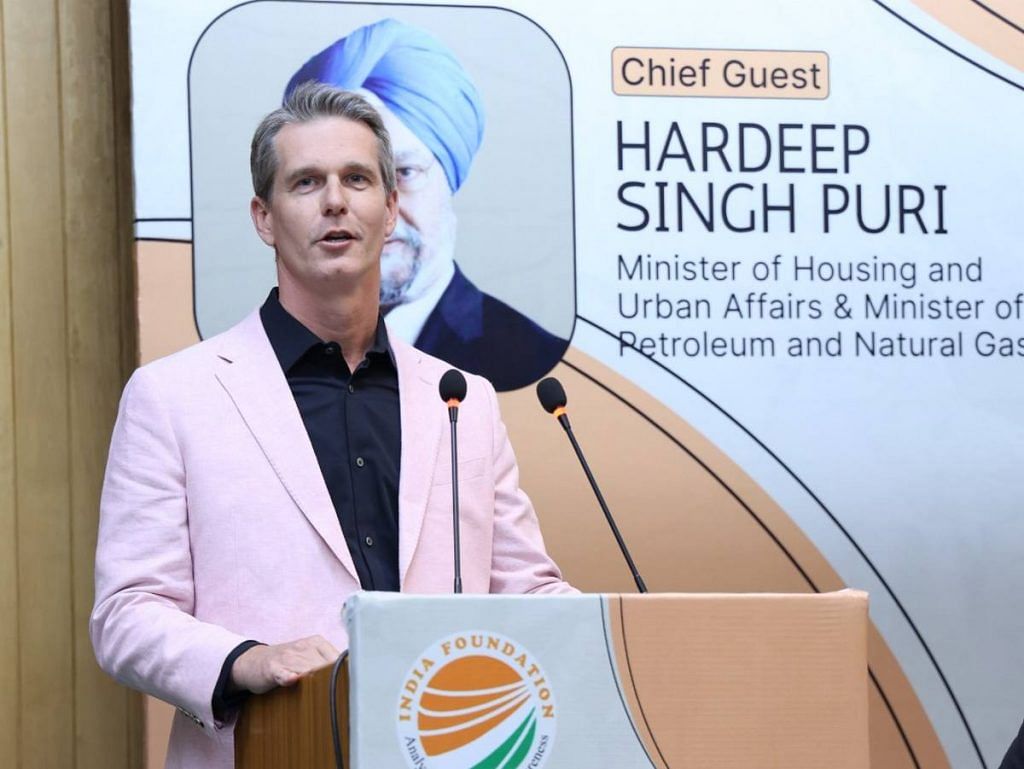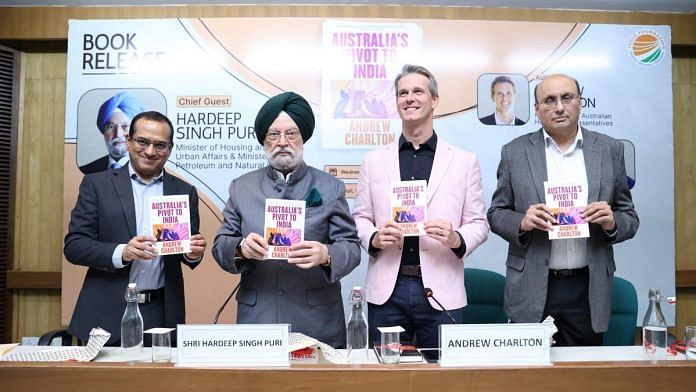New Delhi: About two months after Australia trounced India in the ICC Cricket World Cup final, Australian MP and author Andrew Charlton offered what might be considered a consolation. He revealed that the most common surname in Australian cricket is Singh, not Smith, and that Patels outnumber Joneses. This, according to him, is just one testament to the Indian diaspora’s deep roots Down Under and its crucial role in the country.
“Cricket used to be a sport that Australia played against India. But today, Australia’s best cricketers play in the Indian Premier League,” Charlton noted at the launch of his book Australia’s Pivot to India in Delhi’s India Habitat Centre last week. “The Indian diaspora has not just changed Australia but changed Australia’s relationship with India.”
Students, former diplomats, researchers from think tanks, and others eager to further explore the Indo-Australian relationship filled the room. Among them was Union Petroleum and Natural Gas Minister Hardeep Singh Puri, who in his address lauded the book as “elegantly crafted” and delving into issues that have “preoccupied” both nations since the 1950s.
With a touch of romanticism, Puri, chief guest at the event, added that relationships between countries are not just defined by trade or investment, but need “a certain chemistry or spark”, which India and Australia enjoy.
The numerous former High Commissioners present in the room, the Union minister said, indicated the importance of New Delhi-Canberra ties. “While the West, Gulf, Japan and China have been crucial for India, Australia is coming to acquire a place in this emerging Indian worldview,” he said.
Charlton’s book, published by Pan Macmillan publication, explores the transformation of the India-Australia diplomatic relationship—from acquaintances to friends to family, and finally, partners. Across 300 pages and 22 chapters, the book tackles many ups and downs of India-Australia ties, throwing light on hitherto unseen corners. For instance, Charlton addresses the reasons behind the historic lack of diplomatic commonality between New Delhi and Canberra despite a joint colonial past, as well as the impact of India’s military expansion in the 1980s-1990s. He also presents his vision for the Australia-India partnership in the 21st century.
Also Read: Sheikh Abdullah embodies early nation-building crisis, and of how little power Nehru had
‘Some in Australia would want us to delete China’
An economist and a member of Australia’s House of Representatives, Charlton represents the Sydney suburb of Parramatta, home to one of the country’s largest Indian communities. He painted a rosy picture of the two countries’ ties.
“In Australia’s relationship with India, the conditions have never been more favourable than now. Our interests have never been more aligned, our nations have never been friendlier,” he said.

Charlton pointed to the growing frequency of high-level visits as evidence of this strengthened bond. Last year, Prime Minister Narendra Modi visited Australia twice—a first for an Indian PM. His Australian counterpart Anthony Albanese too set a record by visiting India three times in 2023.
Australian Deputy Prime Minister Richard Marles and Foreign Minister Penny Wong also visited New Delhi in November last year for the 2nd India-Australia 2+2 Ministerial Dialogue. Both countries are partners in the Quadrilateral Security Dialogue (QUAD), along with the US and Japan.
Education is another area where India and Australia are ramping up their collaboration, with Deakin University becoming the first foreign university to set up an international campus at GIFT City, Gujarat last week.
However, where there is talk of international relations with India, the topic of China is never far behind.
Ashok Malik, partner and chair of the India Practice at The Asia Group, who was moderating the session, asked about Canberra’s ties with Beijing and their impact on discussions with New Delhi. To this, Charlton said: “Despite being partners, we have disagreements with China and those have deepened in the past years.” He added that Australia’s “principled approach” of finding common ground even while disagreeing has paid off.
China is one of Australia’s largest trading partners, and the two countries share close ties, albeit with fractious spells. In 2020, for instance, Beijing imposed trade barriers on Australian commodities like barley and wine amid a diplomatic dispute although the impasse has since thawed.
He advised against interpreting the connection with India based on Australia’s dealings with China. “We need to see India as an independent relationship, that we build for its own reasons and not based on our relationship with any other country,” he said. “Some in Australia would want us to delete China and insert India in the diplomatic equation, where India provides the same sense of security in the region… I think that’s a mistake for Australia.”
(Edited by Asavari Singh)



